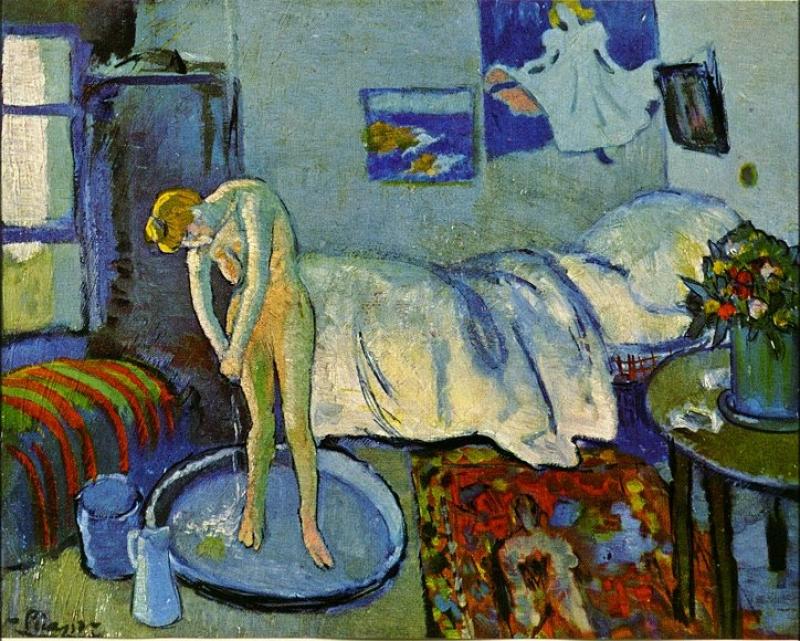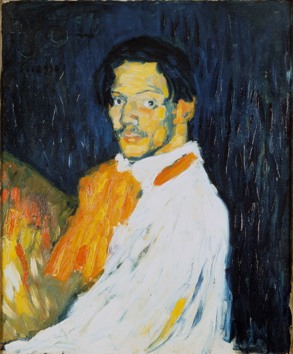Becoming Picasso: Paris 1901, Courtauld Gallery | reviews, news & interviews
Becoming Picasso: Paris 1901, Courtauld Gallery
Becoming Picasso: Paris 1901, Courtauld Gallery
A compelling set of 18 paintings tells of a formative year in the life of the artist

In Yo Picasso!, a self-portrait from 1901 (pictured below, Private Collection), the 19-year-old Picasso is already projecting an inimitable bravura, emphasised by his dashing orange cravat. He looks out at us with that mesmerising and legendary, unwavering and intimidating stare he made his own. Even at the time, critical responses noted his courage and confidence. He had made the first of his several moves to Paris in the spring of that year.
The 18 paintings harvested from public collections held in Moscow, St Petersburg, New York, Paris, Barcelona, Copenhagen, Bern, Zurich and London and anonymous private collections concentrate on Picasso in Paris in 1901. The year comprised two long residences away from Spain, when the hard-partying, hard-loving, hard-painting Picasso was indeed becoming Picasso. He was said to complete as many as three paintings a day; he had his first exhibition with the dealer Vollard, whose portrait by Renoir is on the first floor of the gallery. A contemporary reviewer described him as “the brilliant newcomer”.

One of the major works on view is almost ludicrous, although shot through with both passion and hope. The fantastical Evocation (The Burial of Casagamas) (pictured below, Musée d’art moderne, Paris) is a painfully and poignantly sincere homage to the Spanish poet who was a close friend. The influence of El Greco is typically subverted. Its composition, a strong vertical with figures strewn through spac,e echoes traditional altarpieces without a trace of irony, including playing with proportions, making the scene both unreal and believable as a dream. The Blue Room (main picture) is a haunting painting of his studio in which he acknowledges those he has been looking at so attentively - Lautrec, Degas. Tenderness is evident in awkward but compelling versions of harlequins and columbines, absinthe drinkers, and mothers and children.
The Blue Room (main picture) is a haunting painting of his studio in which he acknowledges those he has been looking at so attentively - Lautrec, Degas. Tenderness is evident in awkward but compelling versions of harlequins and columbines, absinthe drinkers, and mothers and children.
These are neither easy nor likeable paintings, some perhaps not very good, but all distinguished by his burgeoning individuality. So many of his motifs visibly have their origins at the turn of the last century - you can compare with School of Paris and German expressionist works in the next-door galleries. And Picasso from almost the beginning was never sentimental. This compelling selection - not so much a decorous announcement of a new talent as an explosion - is unmissable.
The future of Arts Journalism
You can stop theartsdesk.com closing!
We urgently need financing to survive. Our fundraising drive has thus far raised £49,000 but we need to reach £100,000 or we will be forced to close. Please contribute here: https://gofund.me/c3f6033d
And if you can forward this information to anyone who might assist, we’d be grateful.

Subscribe to theartsdesk.com
Thank you for continuing to read our work on theartsdesk.com. For unlimited access to every article in its entirety, including our archive of more than 15,000 pieces, we're asking for £5 per month or £40 per year. We feel it's a very good deal, and hope you do too.
To take a subscription now simply click here.
And if you're looking for that extra gift for a friend or family member, why not treat them to a theartsdesk.com gift subscription?
more Visual arts
 'We are bowled over!' Thank you for your messages of love and support
Much-appreciated words of commendation from readers and the cultural community
'We are bowled over!' Thank you for your messages of love and support
Much-appreciated words of commendation from readers and the cultural community
 Photo Oxford 2025 review - photography all over the town
At last, a UK festival that takes photography seriously
Photo Oxford 2025 review - photography all over the town
At last, a UK festival that takes photography seriously
![SEX MONEY RACE RELIGION [2016] by Gilbert and George. Installation shot of Gilbert & George 21ST CENTURY PICTURES Hayward Gallery](https://theartsdesk.com/sites/default/files/styles/thumbnail/public/mastimages/Gilbert%20%26%20George_%2021ST%20CENTURY%20PICTURES.%20SEX%20MONEY%20RACE%20RELIGION%20%5B2016%5D.%20Photo_%20Mark%20Blower.%20Courtesy%20of%20the%20Gilbert%20%26%20George%20and%20the%20Hayward%20Gallery._0.jpg?itok=7tVsLyR-) Gilbert & George, 21st Century Pictures, Hayward Gallery review - brash, bright and not so beautiful
The couple's coloured photomontages shout louder than ever, causing sensory overload
Gilbert & George, 21st Century Pictures, Hayward Gallery review - brash, bright and not so beautiful
The couple's coloured photomontages shout louder than ever, causing sensory overload
 Lee Miller, Tate Britain review - an extraordinary career that remains an enigma
Fashion photographer, artist or war reporter; will the real Lee Miller please step forward?
Lee Miller, Tate Britain review - an extraordinary career that remains an enigma
Fashion photographer, artist or war reporter; will the real Lee Miller please step forward?
 Kerry James Marshall: The Histories, Royal Academy review - a triumphant celebration of blackness
Room after room of glorious paintings
Kerry James Marshall: The Histories, Royal Academy review - a triumphant celebration of blackness
Room after room of glorious paintings
 Folkestone Triennial 2025 - landscape, seascape, art lovers' escape
Locally rooted festival brings home many but not all global concerns
Folkestone Triennial 2025 - landscape, seascape, art lovers' escape
Locally rooted festival brings home many but not all global concerns
 Sir Brian Clarke (1953-2025) - a personal tribute
Remembering an artist with a gift for the transcendent
Sir Brian Clarke (1953-2025) - a personal tribute
Remembering an artist with a gift for the transcendent
 Emily Kam Kngwarray, Tate Modern review - glimpses of another world
Pictures that are an affirmation of belonging
Emily Kam Kngwarray, Tate Modern review - glimpses of another world
Pictures that are an affirmation of belonging
 Kiefer / Van Gogh, Royal Academy review - a pairing of opposites
Small scale intensity meets large scale melodrama
Kiefer / Van Gogh, Royal Academy review - a pairing of opposites
Small scale intensity meets large scale melodrama
 Jenny Saville: The Anatomy of Painting, National Portrait Gallery review - a protégé losing her way
A brilliant painter in search of a worthwhile subject
Jenny Saville: The Anatomy of Painting, National Portrait Gallery review - a protégé losing her way
A brilliant painter in search of a worthwhile subject
 Abstract Erotic, Courtauld Gallery review - sculpture that is sensuous, funny and subversive
Testing the boundaries of good taste, and winning
Abstract Erotic, Courtauld Gallery review - sculpture that is sensuous, funny and subversive
Testing the boundaries of good taste, and winning
 Edward Burra, Tate Britain review - watercolour made mainstream
Social satire with a nasty bite
Edward Burra, Tate Britain review - watercolour made mainstream
Social satire with a nasty bite

Add comment